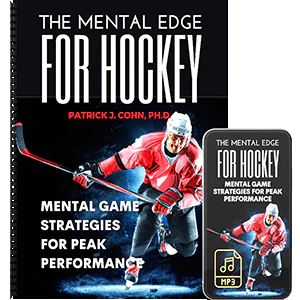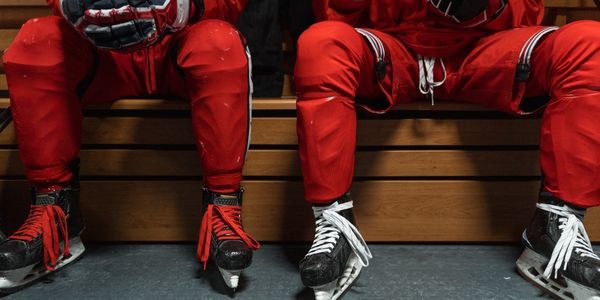Does a Bad Game Effect your Game & Future Performances?
A bad game has the potential of having a long-lasting negative impact. Can you think of times when you were called for a penalty or a bad pass in your defensive zone that led to a game-winning goal? How did you feel afterward?
You probably felt you let down the team and were the reason your team lost. Those are quite normal thoughts and feelings.
However, those thoughts and feelings will linger if you don’t deal with or process your performance. You will repeatedly replay those moments, potentially affecting the next practice and game.
Unexamined mistakes can shake your confidence and create self-doubt. This is a mental trap many hockey players fall into – allowing one play to affect their future performances.
Unfortunately, you can’t turn back time and replay the game, and holding on to negative thoughts and feelings about a loss stunts your growth as an athlete.
The only way to use the experience for growth is to objectively break down your performance several hours after the game:
- What was the situation?
- What exactly happened?
- What was a better option?
- What can I do differently under similar circumstances in future games?
- How can I mentally and physically train to ensure I respond positively?
You can’t change the past but can learn from it to improve future play. This mindset empowers athletes, fuels motivation, and helps maintain a high degree of confidence.
With 22 games remaining in the 2024-25 NHL season, the New York Rangers are battling for a wildcard spot. Every game this late in this season is important.
In a game against the Toronto Maple Leafs, the Rangers made a mental mistake and gave up a goal six minutes into the third period, which eventually gave the Maple Leafs a 3-2 victory.
After the game, Rangers forward Vincent Trocheck talked about the importance of processing, learning, and letting go of mistakes.
TROCHECK: “A couple mental lapses on our part that ended up killing us in the end but overall, I think there were a lot of good things to take away. You’re disappointed, but every game this late in the season, you have to look at it, take what you can, learn from it, and then move on to the next game, you can’t really focus on it too long.”
Successful athletes never waste an opportunity to grow their game. Instead of dwelling on past failures, they use them to improve mentally, emotionally, and technically.
Elite hockey players recognize there is something to learn from the good, the bad and the ugly and commit to using all experiences to improve their play on the ice throughout their careers.
To move forward, you must first acknowledge and accept your mistakes, without beating yourself up. The next step is to shift your perspective.Instead of focusing on failure, use it as an opportunity to take your game higher. Finally, recognize that one mistake does not define you as a player.
Related Articles on Hockey Mental Game:
- Rebounding and Winning in Hockey
- The 5 Mental Game Skills for Playoff Comebacks
- Using Your Mind to Close Out Hockey Games
*Subscribe to The Sports Psychology Podcast on iTunes
*Subscribe to The Sports Psychology Podcast on Spotify
The Mental Edge for Hockey

The Mental Edge for Hockey teaches you proven and simple mental game strategies so you can overcome fear of failure, lack of confidence, slumps or poor composure, take your practice game to competition, and boost your confidence in hockey. You learn simple, actionable mental game strategies to help you perform at your peak!
I’ve worked with athletes for 30 plus years – and know the top challenges that undermine performance when you perform in games. Now you can tap into my expertise and experience in coaching hockey players on the mental game.
In this program, you’ll learn the TOP 10 mental training lessons for hockey players – the same strategies I teach one-on-one athletes I coach on the mental game. My clients pay thousands of dollars for personal coaching, but now you can have the same strategies to improve your mental game – at a fraction of the price.

Leave a Reply